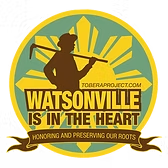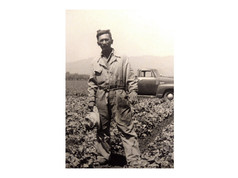
THE LAZO FAMILY
Leon J. Lazo was born in Santo Domingo Ilocos Sur Philippines on April 11, 1905, to Esteban T. Lazo and Georgia C. Jaramillo. He sailed from Manila to San Francisco on July 11, 1924, on the S.S. President Lincoln.
While on the West Coast, he moved around the region and followed the crops as a migrant farmworker. He reunited with his brother Cipriano J. Lazo in 1930 where he reportedly worked as a supervisor on a pea farm in Arroyo Grande. Records show he worked as a supervisor to 43 other Filipino men before settling into Watsonville.
Later, in 1940 he began farming steadily and living permanently in the Pajaro Valley. He lived with Cipriano on San Juan Road and worked at the Rowe Ranch and honed his craft and skills as he developed his reputation as a strong and productive farmer.
Later, he moved to San Miguel Canyon Road and met and married Emma Mae Rosser. Her brother John Rosser met Mary Virginia Terkla and the unwed couple had a young child named Johnny Rosser in 1940. Tragically, Mary Virginia was overtaken by cancer and young Johnny came to live and grew up with Leon and Emma Mae. They raised Johnny as their own.
“It’s hard to explain,” said Johnny Rosser. “I worked in the fields with my dad (Leon J. Lazo) and my adopted mom from when I was 3 up until I left home to join the Navy. I couldn’t have asked for a better father, even though my real dad was around, but never gave any attention to me.”
Johnny Rosser said Lazo was a very hard-working, well-respected and a meticulous farmer in the Pajaro Valley. Rosser fondly remembers learning how to grow and cultivate a variety of crops like lettuce, pole beans, cauliflower, squash, and sugar beets with his parents.

He said his father never lost a crop and propagated plentiful and quality produce. He explained that his dad was a sharecropper. Since he could not buy land, he had to lease it, work it, supervise it, and split the earnings with the landowner. Through his hard work and diligence, Leon was able to buy his own land when Alien Land Laws subsided and were ruled unconstitutional in 1952.
He said his father never lost a crop and propagated plentiful and quality produce. He explained that his dad was a sharecropper. Since he could not buy land, he had to lease it, work it, supervise it, and split the earnings with the landowner.
Through his hard work and diligence, Leon was able to buy his own land when Alien Land Laws subsided and were ruled unconstitutional in 1952.
“I could have never asked for a more loving and dedicated family life,” he said. “My dad and all of my uncles were the best. Other kids would bully me when I told them I was Filipino, but I didn’t care.” “They showed me how to work hard, how to be responsible, and how to do the right thing in life,” he added. “I really miss all of them; the music, the picnics and just hanging out with them.”
Leon J. Lazo was a member of the Watsonville Filipino Community Center, St. Patrick’s Church, and Filipino Catholic Association. He passed away in May of 1994. Johnny spent 8 years in the United States Navy and worked at the Grand Auto Store in downtown Watsonville for many years. He has five children.